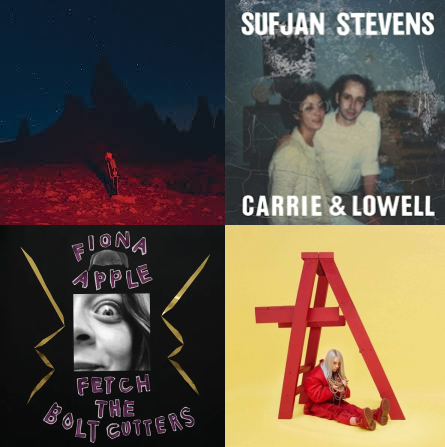The science behind your sad playlist

Olof Grind, Steven Carlson, Chris Sikich and Kenneth Cappello
Many artists with prominently sad music have seen great success in recent years including Fiona Apple, Billie Eilish, Sufjan Stevens and Pheobe Bridgers.
October 8, 2021
The rise in popularity of artists like Phoebe Bridgers, Billie Eilish and Sufjan Stevens forces us to ask ourselves a question: why do we listen to sad music? All three of these artists release almost exclusively melancholy music but have experienced enormous success nonetheless. This is because people tend to enjoy listening to sad music, a phenomenon that music researchers have studied for decades.
The inclination to listen to sad music is referred to by psychologists Jonna Vuoskoski, William Thompson, Doris McIlwain and Tuomas Eerola as the “paradox of pleasurable sadness.” This paradox is so puzzling because, according to Vuoskoski et al., “people generally avoid negative emotional experiences.” However, this rule seems to be opposed by musical tendencies, as “they often enjoy sadness portrayed in music.”
Researchers have taken many approaches in attempting to understand and answer this paradox, with Vuoskoski et al. conducting a study in which a group of participants were asked to rate their responses to a variety of music. They discovered that listeners did not simply feel negative emotions while listening to unhappy music, but they also experienced “a range of more positive, aesthetic emotions,” such as nostalgia and hope.
The Journal of the European Society for the Cognitive Sciences of Music found that sad music “relates to acceptance-based coping via the recognition and identification of emotional states.” They also found that people are likely to feel acceptance of their negative emotions through listening to unhappy music and are able to use this music as an “important self-regulatory strategy.” Not only can sad music help people find peace in their sadness, but it even aids in coping with it.
Similar conclusions were drawn by psychologist Adrian North, who says there are two possible explanations for this paradox, one from social psychology and the other from cognitive neuroscience. The social psychology explanation comes from a process called “downward social comparison,” which refers to the comfort a person feels from knowing somebody else is having a worse time than they are. When listening to sad music, many are comforted by the pain conveyed in the song being greater than their own. The neuroscience explanation, which North emphasizes more, is that melancholic music is related to the hormone prolactin, which curbs grief. When listening to sad music, the body releases prolactin, essentially preparing itself for a traumatic event and when one does not occur, the body is left with a pleasurable mix of hormones that boost emotions.
A study conducted by The American Journal of Psychology on the paradox of pleasurable sadness tested physical responses to sad music, concluding that many individuals experience an empathetic response, called “the contagion mechanism,” to melancholic music. This response is evoked due to the voicelike qualities of instruments such as the violin or by lyrical music itself. The team of psychologists concluded that this was an evolutionary characteristic of empathy rather than a personal experience, as previous research suggests.
The contrasting outcomes of various studies surrounding the paradox do not render any results unusable or inaccurate. They simply suggest that this psychological occurrence is complex and has no one right answer. Every individual will experience music, art and sadness differently. What it does tell us, however, is that the urge to listen to melancholic music is not necessarily indicative of negative emotions and can even be helpful in accepting and coping with trauma and sadness.
So the next time you’re in the mood for some Fiona Apple or find yourself playing Phoebe Bridgers’ “Funeral” on repeat, just let it happen. Playing your sad playlist does not mean you are sad or depressed as you might initially believe. In fact, this genre could even help you resolve unhappiness and empathize with others.








